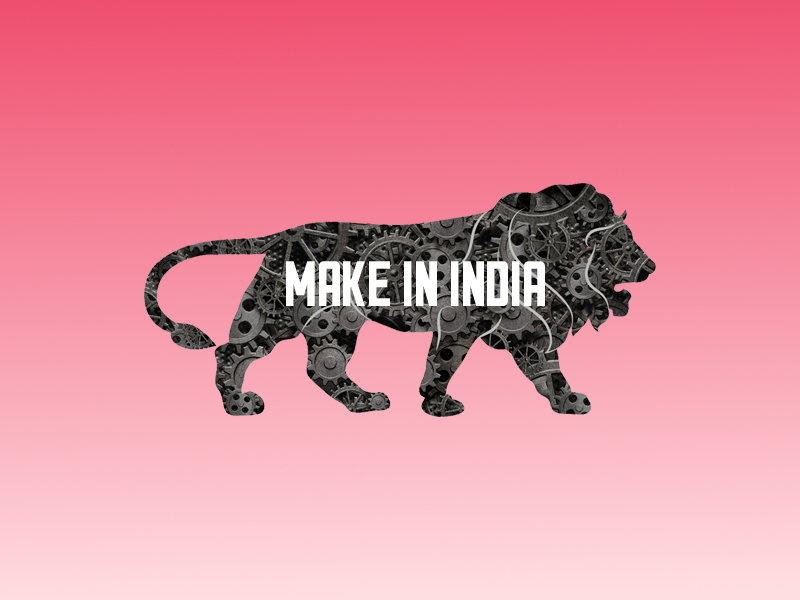It is now almost six years since the Government of India launched its flagship industrial program, the Make In India, in September 2014. However, as Shri P. Chidambaram Ji authored and compellingly pointed out in a widely acclaimed media article in June 2017, the Make In India programme (MIIP) is a failure on most counts[1]. It is clear that the Central Government has lost the policy narrative on its flagship industrial program. Globally, with the advent of new industrial concepts such as the Fourth Industrial Revolution (or Industry 4.0), it is evident that disruptive changes to business models are bound to happen across the world, including in India. Multiple critical drivers of industry transformation currently impacting global industries are likely to have a considerable impact on jobs and job creation.
It is common knowledge that under the MIIP, the NDA government wanted the share of manufacturing to national GDP to touch 25% within a few years. However, that aim remains far from being realized, with manufacturing as a percentage of Indian GDP hovering around the 18% mark only. With the advent of modern technological paradigms such as ‘Industry 4.0’ (i.e., utilizing automation and sophisticated data exchange or analysis in manufacturing), it is difficult to gauge whether manufacturing will generate the millions of jobs required for India’s teeming youth and graduates.
However, Micro Small & Medium Enterprises (MSMEs), which have the potential to generate sustainable jobs, can support delivery of innovative research and development (R&D) ideas to large manufacturing companies or clusters. By their inherent nature, MSMEs are flexible and readily scalable, but will need help in terms of mentoring and consulting support for being able to respond to dramatic shifts in the global manufacturing marketplace. It is necessary to fill the void in the support system available to Indian MSMEs by initiating dialog and discussion on a national framework to support technology integration, globalization and multi-manufacturing portfolio development for expansion of value-added manufacturing activities and creation of sustainable jobs via MSMEs.
Policy-makers, around the world, are grappling with the question of whether disruptive technologies create or displace jobs. While previous technological developments or revolutions (like the industrial revolution of the 1800s) played out across long time periods, the pace of the ongoing digitally-enabled transformation is almost blinding. Re-skilling should be coupled with job creation through measures like encouraging MSMEs clusters that bring them into the vicinity of much larger companies or industry leaders, so that they can develop synergies and industrial cooperation around shared technological themes. Fostering cooperation in R&D that is powered by a grander vision of the likely economic benefits to the nation will yield a sharper culture of innovation, too.
To make the potential a manifested reality, facilitating the integration of small Indian businesses into supply chains of pooled human capital and technological capabilities is vital. This can be done by breaking down barriers of communication between small businesses associations across the country, which will in turn, help improve overall national competitiveness, particularly in the area of quality manufacturing. From a competitiveness perspective, thousands of small Indian businesses are generally concerned about whether they can obtain and preserve the production, sales outreach and research capabilities required to develop and produce cost effective and high-quality products. The success in facilitating their participation in global supply chains will translate into sustainable jobs and better social mobility for millions of Indian citizens.
The questions of skills availability too lingers. Companies in significant productive sectors of the Indian economy should be generating considerably more and better-quality jobs as an offset to rapid technological changes that threaten to inflate greatly the existing gap between available generic skill-sets and those demanded by a globalized labor market. In this context, the National Skill Development Programme that was launched in 2010 by the then UPA government was a significant game changer. The program was repackaged as Skill India in 2014 by the BJP-led NDA government. The general consensus is that Skill India under the NDA has been a failure.
In order to reclaim the intended effectiveness of the original National Skill Development paradigm, it is now important to develop integrated policies that can reinforce the roles that family circumstances, the larger labor market, and the available physical and social infrastructure can play in the development of usable human capital. Given India’s socioeconomic profile, skilling programs should not pivot on the formal sector alone, but must accord importance to the informal sector too. In this context, employer-driven accreditation and standards can play a crucial role. Thus, involving the private sector and industry in planning policy developments, in conjunction with customary government agencies, may prove useful.
Another area of concern under the MIIP is India’s spending on R&D (in terms of percentage of national GDP), which is conspicuously low at about 0.6 percent[2]. This is far lower than that of notable global counterparts such as U.S. (2.74 percent), China (2.07 percent), etc. Without greater expansion of R&D spending, attempts at reforming India’s education and vocational training system (along with re-skilling or up-skilling programs) will not yield the desired outcomes. Leveraging India’s inherent strengths in terms of R&D will help in furthering the agenda of a fair and comprehensively inclusive jobs market, while helping to promote the nation on the international stage for trade and investment purposes.
However, inherently protectionist values can stifle shared prosperity. For e.g., on September 26, 2018, Government of India announced that it is raising import tariffs (or customs duties) on 19 “non-essential items,” in a bid to contain the widening current account deficit and interdict a sharp slide in the rupee’s value. Ikea, an international investor in India, pointed out that trade barriers (like import duties) are against the ideals of a global economy, ultimately leading to higher costs of production in India. In an age of brewing international trade wars, knee jerk alterations in key factor inputs can disrupt delicate cost control measures that manufacturers have put in place. This runs the risk of not only abruptly escalating manufacturing costs, but has important ramifications for India’s manufacturing policy, too.
Also, the media has been reporting that some smartphone manufacturers are importing some of their smartphone models into the country as production levels in their Indian plants stagnate due to COVID-19 fears. More than ever, innovative solutions are required now as ensuring safety against an invisible enemy to health (i.e., the coronavirus) clashes against the need to raise the manufacturing industry back up to nearly full strength. What role concerned stakeholders can play in devising solutions for maintaining the safest environment possible for employees is a key question now. Multiple stakeholders will have to pool engineering and technical prowess to help combat the current challenges, as otherwise, multiple manufacturing supply chains can start collapsing, leaving thousands of Indian jobs vulnerable. There are no easy solutions, but a collective thinking process in a focused manner on the important question of Indian manufacturing can throw innovative and p
[1] https://indianexpress.com/article/opinion/make-in-india-narendra-modi-good-manufacturing-value-added-services-gdp-indian-economy4698205/
[2] https://www.brookings.edu/blog/techtank/2018/05/17/artificial-intelligence-and-data-analytics-in-india/


